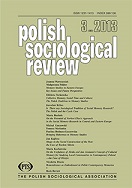On the Potential of Norbert Elias’s Approach in the Social Memory Research in Central and Eastern Europe
On the Potential of Norbert Elias’s Approach in the Social Memory Research in Central and Eastern Europe
Author(s): Marta BucholcSubject(s): Social Sciences
Published by: Polskie Towarzystwo Socjologiczne
Keywords: Norbert Elias; memory; Central and Eastern Europe; knowledge; communication; symbols; fantasy.
Summary/Abstract: Norbert Elias never presented his views regarding collective memory in a systematic manner. However, his approach may be reconstructed on the basis of such works as The Civilizing Process, Time: An Essay and The Symbol Theory. The most important tenet of Elias is that human memory can only be explained by the symbol theory. Human ability to use socially created symbols in communication is applied in activities in which symbols are used (speaking, thinking, knowing and remembering), which makes memory a part of general process of symbolic communication. Memory research needs to account for the interactive and communicational origins of both individual and collective remembering. One of the crucial issues related to remembering is collective forgetting. According to Elias it operates by three main mechanisms: (1) elimination and creation of fantastic notions (fantasy being a substitute and subsidiary for experience), (2) modification of social canons of reference as a result of power struggle in social figurations, and (3) delegitimization of alternative imageries by means of marginalization or elimination of groups acting as their social vehicles. I discuss these mechanisms and the dynamics of memory they entail in the broader conceptual framework of the theory of civilizing processes referring to Central and Eastern European examples in order to demonstrate the productivity of Elias’s interdisciplinary and multidimensional analysis in social memory studies focusing this region
Journal: Polish Sociological Review
- Issue Year: 183/2013
- Issue No: 3
- Page Range: 317-334
- Page Count: 17
- Language: English

